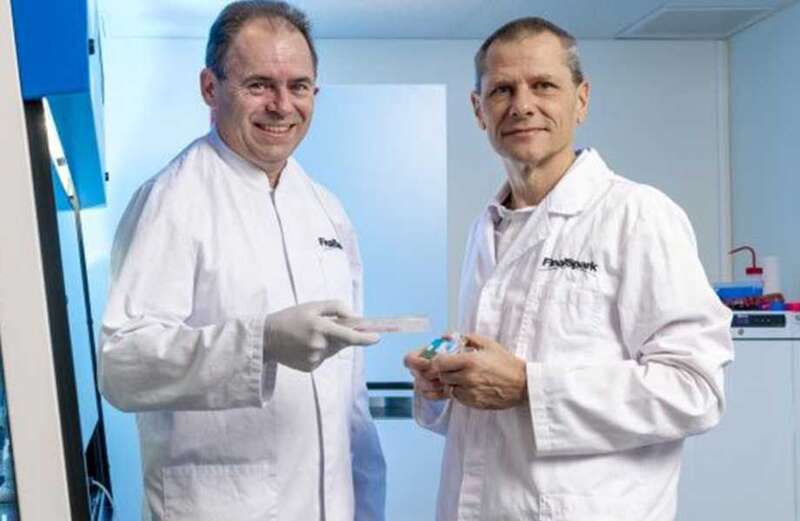A FRANKENSTEIN-like biocomputer powered by human mini-brains could become the world's first living processor, claim its creators.
The ghoulish project - which runs on nutrients - is being used for research into the grim-sounding “wetware computing.”



FinalSpark, a pioneering Swiss biocomputing startup, is giving around-the-clock access to 16 human brain organoids to help develop the world’s first living processor.
Biocomputers are basically computers which draw memory and power from human neurons – or brain cells, explained Cosmos magazine.
In FinalSpark’s project, it uses brain organoids, with the aim of creating a living processor that works faster, is more efficient, and more powerful than silicon-based computing and AI.
 How to tackle thorny first date subjects… and why you should watch the waiter
How to tackle thorny first date subjects… and why you should watch the waiter
Organoids are smaller, simpler versions of any organ - such as livers and hearts - and are three-dimensional tissue cultures that are derived from stem cells.
Last month, FinalSpark announced that it had launched the first-ever online platform enabling researchers to conduct remote experiments on its lab-grown human mini-brains.
These bioprocessors are “composed of living neurons [nerve cells] capable of learning and processing information,” the firm said.
"The neuroplatform enables researchers to run experiments on neural organoids with a lifetime of even more than 100 days," it wrote in a paper published by Frontiers in Artificial Intelligence.
FED NUTRIENTS
The firm said it had streamlined the process to quickly produce new organoids and zap them with electrical stimulations.
It has used more than 1,000 brain organoids over the past three years "enabling the collection of more than 18 terabytes of data."
The living, pulsing brain cells are kept alive with a special fluid, said Science Alert.
The 16 organoids were connected to "eight electrodes each and a microfluidics system that supplies water and nutrients for the cells," it said.
USE LESS POWER
FinalSpark claimed that using human neurons for biocomputing was more environmentally friendly than traditional processors.
The benefit is they "consume a million times less power than traditional digital processors," it added.
 Secret way Tesco staff bag freebies & it’ll have you desperate to work there
Secret way Tesco staff bag freebies & it’ll have you desperate to work there
"[They] potentially reduce the environmental impact associated with the rising use of computers.
"Already, three dozen universities have expressed interest in using the platform.
"FinalSpark has granted free access to nine institutions for research use only."
And it claimed there was growing demand for its "neuroplatform."
WETWARE
"We are prepared to scale up to meet it, all with the shared goal of building the world’s first living processor," the firm said.
"The convergence of AI, recent advancements in biology, and stem cell technologies have opened up new horizons in the field of synthetic biology and wetware computing."
Wetware refers to a mixture of software, hardware, and biology, said Lifewire.
"Wetware is commonly associated with devices that interact or merge with biological material," the site added.
“We firmly believe that such an ambitious goal can only be achieved through international collaboration,” said Dr Fred Jordan, co-founder of FinalSpark.
But, the use of human-derived tissue in such projects has raised many ethical and moral questions.
Harvard University bioethicist Insoo Hyun told Harvard Magazine last year he was concerned about the appropriate use of organoids.
He said that people participating in research by providing their own biomaterials may regret it later on - but may not be able to do anything about it.
“There’s a deep philosophical moral value underlying this need for proper informed consent," he said.
"Much of the concern about organoids has focused on the idea of consciousness," said the magazine.
"The worry [is] that as the tissues grow more complex and sophisticated — closer to the human brains they’re built to mimic — they might become sentient and self-aware, or begin to feel pain."
But the consciousness question is not yet a main concern, according to Hyun, as organoids are so small and simple.
You can start manipulating the system, doing things you cannot ethically do with human brains
Thomas Hartung, professor
A biocomputer powered by human brain cells could be developed within our lifetime, according to Johns Hopkins University researchers.
"Colleagues at Johns Hopkins have been working with brain organoids, orbs the size of a pen dot with neurons and other features that promise to sustain basic functions like learning and remembering," the uni said last year.
"Computing and artificial intelligence have been driving the technology revolution, but they are reaching a ceiling," said Thomas Hartung, a professor of environmental health sciences.
"This opens up research on how the human brain works.
"Because you can start manipulating the system, doing things you cannot ethically do with human brains."
FRUIT FLY
Each organoid contains about 50,000 cells, about the size of a fruit fly's nervous system.
And Hartung said he envisions building a futuristic computer with such brain organoids.
"The brain is still unmatched by modern computers," Hartung added.
The research comes months after Elon Musk announced the first Neuralink brain chip implant had been successful.
The first human to have Musk's brain chip implanted was told not to worry about the monkeys who died while the chip was being tested.



































